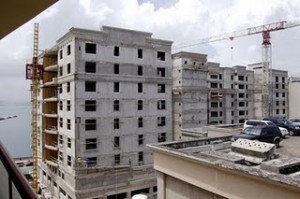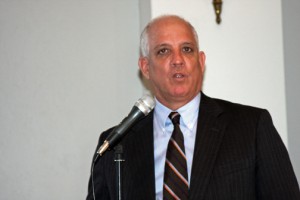Puerto Rico home sales at risk due to new federal rules


From left: José Alberto Feliciano, executive vice president of the Puerto Rico Homebuilders Association, Mortgage Bankers Association President Agustín Rojo and Luis Raúl Padilla, president of the Mortgage Loan Officers Association.
Puerto Rico’s mortgage bankers and housing developers raised a red flag Tuesday to warn about the potentially devastating effects of a recently enacted federal regulation that sets new parameters that could make it difficult for would-be island home buyers to qualify for loans starting next year.
During a news conference at the Mortgage Bankers Association’s headquarters in Hato Rey, trade group President Agustín Rojo explained that last week, the Consumer Financial Protection Bureau issued new mortgage regulations that tighten up the requirements under which banks can qualify consumers and approve their mortgage loans. The new regulations go into effect Jan. 10, 2014.
The CFBP explained that its rationale for implementing the new guidelines responds to the mortgage crisis that affected the U.S. mainland several years ago, as a result of what it called “loose underwriting practices by some creditors.”
“… including failure to verify consumers’ income or debts and qualifying consumers for mortgages based on “teaser” interest rates after which monthly payments would jump to unaffordable levels — contributed to a mortgage crisis that led to the nation’s most serious recession since the Great Depression,” the agency said.
However, because Puerto Rico’s mortgage banking industry has been traditionally conservative when it comes to approving loans, the island was mostly spared when the mortgage bubble burst.
“In Puerto Rico there is a correlation between the island’s economic problems and foreclosures, not between loan parameters and foreclosures,” said Rojo. “To protect customers on a national level, the CFPG is establishing these regulations across the board that also affect Puerto Rico, which has always operated under conservative mortgage parameters and will now be affected in terms of gaining access to loans.”
The new federal guidelines require applicants to not have more than 43 percent of their income tied to debt, including the mortgage payment. For example, if a consumer has a $2,000 monthly income, under the new parameters, they cannot have expenses greater than $860, including the mortgage payment and other obligations such as car payments or additional loans, said Luis Raúl Padilla, president of the Mortgage Loan Officers Association.
As approved, the new regulations could block more than 40 percent of Puerto Rican consumers from obtaining home loans starting next year, a situation that represents another blow to the already fragile housing industry, Rojo said.
Stating the case
To address the looming situation, the MBA will travel to Washington next week to meet with CFPG officials to lay out the reasons why Puerto Rico should be granted a one- or two-year stay from having to comply with the new parameters, Rojo said.

The housing construction company has been suffering as a result of the island’s economic slowdown, not the mortgage crisis. (Credit: © Mauricio Pascual)
“We’ll be delivering the message that Puerto Rico is a unique market with different needs and behavior when compared to other jurisdictions,” Rojo said. “Foreclosures have been lower here than in other states. Why implement rules across the board without considering Puerto Rico’s needs, when we can look for alternatives that can fit those needs locally?”
To back up its argument, the MBA commissioned research firm Estudios Técnicos to conduct a study of the impact the new regulations will have upon local consumers. During the news conference, firm Economist Graham Castillo said 27,200 loans approved in the past two years — including mortgages and refinancing — were analyzed to see how many would not qualify under the new rules, concluding that 45 percent of new mortgage loans and 27 percent of refinancing loans would have been denied.
“This means that during those two years, some 27,000 loans would not have qualified, representing $3 billion in value,” he said. “Of those, 53 percent were mortgage loan originations.”
Under the new scenario, the brunt of the impact would fall on consumers with lower incomes — families with a combined $40,000 in income.
“We found that in that case, 45 percent of mortgage loans would be denied,” he said.
Local alternatives to address problem
The housing and mortgage executives said Tuesday all is not lost, because the CFPB has granted an exception to its “Qualified Mortgage” rule, which allows mortgage loans managed by local housing agencies, such as the Puerto Rico Housing Finance Authority, to automatically comply with the federal requirements.
“This means that in Puerto Rico, we already have the perfect tool to develop a local mortgage market that is functional, effective and within current federal regulations,” Rojo said.
That said, the MBA and other trade groups urged the government to brainstorm with them to find alternatives that adjust to local consumer reality, whose economic landscape does not fit under the federal parameters that impelled the new regulations.
The groups suggested that the government modify the “Mi Casa Propia” housing assistance program to eliminate the restrictive conditions that currently require a possible repayment of the granted incentive, in certain cases. By doing away with that, the local program would meet all of the Federal Housing Authority requirements and could be used in tandem with FHA loans.
Another proposal would be to establish a competitive mortgage securities program in the secondary market through the Housing Finance Authority, making it a guarantor of issued loans. They would qualify automatically as “Qualified Mortgage” loans and could also boost the economy and assist lower-income consumers, while becoming a revenue source for the local agency.
“Puerto Rico also needs to figure out ways to lower the costs associated with the loan application process,” said Padilla. “Puerto Rico is one of the most expensive jurisdictions when it comes to mortgage applications, when government taxes and attorney fees are factored in.”
Shift to rentals possible, but not now
If nothing can be done to push off the application of the federal regulations, Puerto Rico could potentially see a shift into the rental market. However, that could pose a challenge as well because local residents have historically opted for buying their home, rather than renting.
As a result, the island’s rental sector is “not as mature or as formal as it is in other jurisdictions,” said Rojo.
“We have a feeling the CFPB could suggest that the island move toward the rental market and our answer to that would be that if that happens, we would be leaving local consumers without options,” he added.
On the other hand, developers could also be affected because they claim affordable housing is already at the lowest prices possible, said José Alberto Feliciano, executive vice president of the Puerto Rico Homebuilders Association.
“Developers see rentals as an immediate solution for people, but one that would happen in the mid- or long-term. Our infrastructure is not adequate — our eviction process is inefficient, there isn’t an appropriate rental market offer to satisfy demand, so it’s not a viable option to mitigate the possible repercussions of the regulations that take effect next year.”















Carlos implementan estas normas porque pueden aqui y alla Atemperence a las nuevas condiciones y no esperen que hagan excepciones. porque insistir en crear casa champagne cuando la MayoRia del Pueblo tiene presupuesto para mavi si acaso. Construyan casas mas economicas las cupulas geodesicas son alternativas viables y seguras.geodesic domes ver buckminster fuller brillante norteamericano que por decadas ha sugerido esta alternativa para viviendas. Construyanlas en PR .legislen y eduquen para que el pueblo vea una luz en cuanto a financiacion y habitat se refiere.
Financear cupulas geodesicas
Ver Buckminster Fuller.Legislar para construcion y accesibilidad de Banca hacia ciudadano en aprobacion interna de estos prestamos a ciudadanos.mas volumen al pueblo y no a la elite. fomentar alternativas fuera del fisco federal. Hay otros paises prestos.